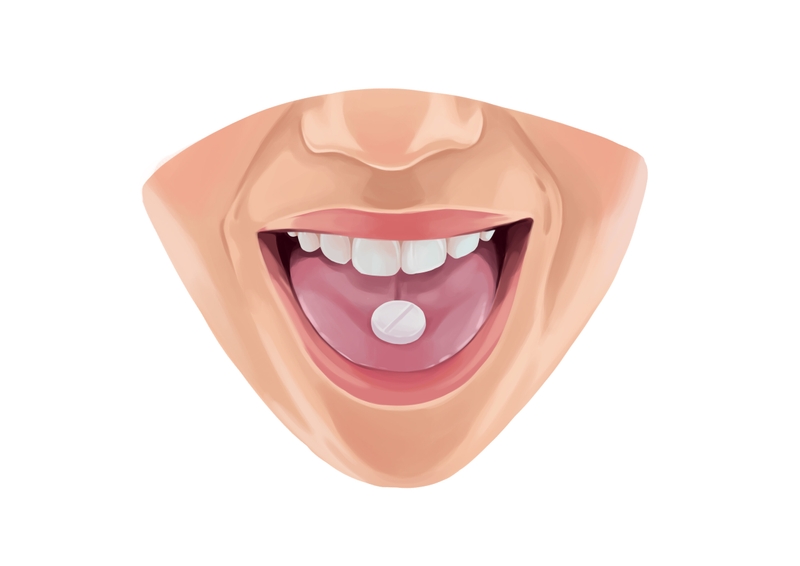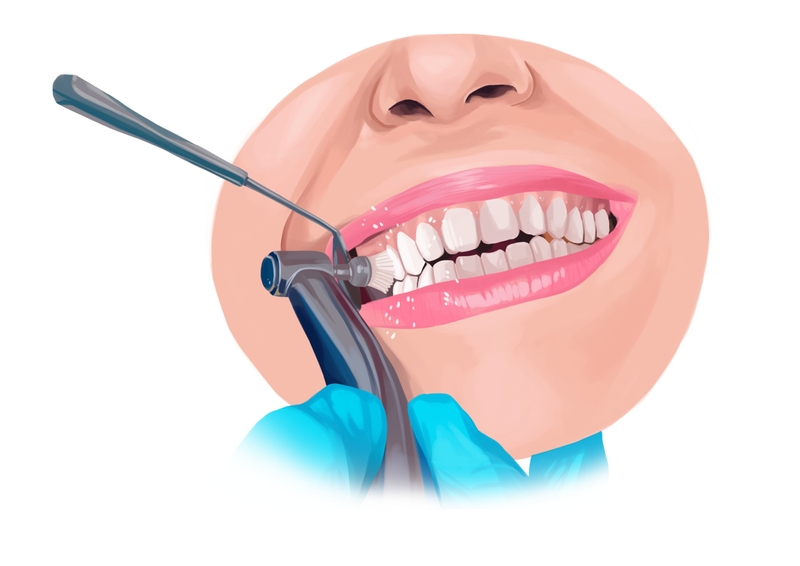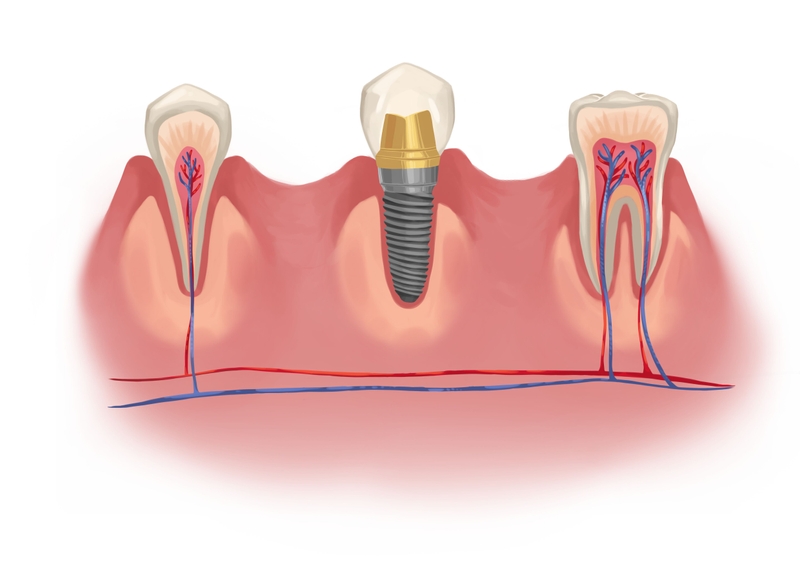- Avoid touching the implant area and avoid vigorous mouth rinsing. Get adequate rest and avoid physical exertion and vigorous exercise for about a week.
- Take Tylenol for pain relief, but do not take NSAIDs.
- Avoid hot meals and drinks as well as hard and crunchy foods for at least a week after surgery
Unlock the magic of your smile. Use Authority Dental to book an appointment for teeth implants near you. It's fast, easy and reliable.
What is the best way to take care of your health after dental implant surgery? Here's everything you need to know.
Begin proper care immediately after surgery
As soon as your surgery ends, the dental implant care process will begin. Start resting on the way home. Arrange for someone to drive you. This is when the effects of anesthesia will start to wear off.
The most important things to keep in mind are not to touch the implant area and to avoid vigorous mouth rinsing.
Most symptoms of tooth implant recovery are not a significant cause for concern. Follow dental implant care instructions right after surgery and continue for a few days.
Control bleeding
Bleeding from the implant site or redness in the saliva can continue for up to 72 hours after dental implant surgery. The best way to control it is to bite down on gauze for about an hour. Repeat every 6-10 hours as necessary after you return home.

If bleeding is excessive, bite down on a moistened black tea bag instead. Tannic acid constricts blood vessels, making it easier for blood clots to form.
To avoid unnecessary bleeding, try to remain calm, sit upright, and refrain from physical exercise. Do not bend over or lift anything heavy. Forceful spitting, smoking, and using a straw can also complicate the formation of blood clots.
Manage pain

Picture by Authority Dental under CC 2.0 license
The most common OTC painkillers are Advil, Aleve, and Ibuprofen. These, however, belong to a group of drugs called NSAIDs. Studies show that they can interfere with the osseointegration process. The best remedy for pain post-implant placement is Tylenol.
Take it just before anesthesia wears off or when you feel discomfort is too severe. Adhere to the instructions on the packaging. Your dentist can also offer insight into which products and dosages might be best for you. The rule of thumb is not to take painkillers more often than every 6 hours.
Pain and discomfort should ease up around 4 days after the surgery. You may also experience throat stiffness and difficulty swallowing. If these symptoms persist, contact your dentist. He or she may prescribe something more substantial.
Antibiotics are not to be taken for pain itself. Your doctor will prescribe a course if he or she suspects an infection.
Lee warns: "I also provide a particular instruction regarding pain management: avoid common NSAIDs like ibuprofen (Advil/Motrin) unless specifically told otherwise. Clinical consensus among implant specialists favors Acetaminophen (Tylenol) because NSAIDs can actually interfere with the critical osseointegration process—the bone's fusion to the implant. While managing discomfort is important, protecting that developing bone-to-implant bond takes absolute priority."
Minimize swelling and bruising
Swelling and bruising on your face and gums often appear on the day after your surgery. Sinus lifting might trigger bruising around your nose and eyes. The discoloration will peak 2-3 days after you return home, and it will disappear on its own.
If it bothers you, you can place an ice pack on your face, closest to the affected area. Keep it on for 15-20 minutes at a time, take a break, and repeat for 48 hours after surgery. Some OTC products also have an anti-inflammatory effect, but use them with caution, as they can disrupt the healing process.
Other things you can do include avoiding salt, staying hydrated, and sleeping in a propped-up position. Stack 2-3 pillows under your head when you go to bed.
Get enough rest
Most patients return to work the next day. If, however, your job requires strenuous activity, take a few days off.
Physical exertion and vigorous exercise should be avoided for about a week. Also, make sure to get enough sleep, ideally 7-8 hours, every night. A big part of the healing process takes place in bed.
Maintain proper oral hygiene

Picture by Authority Dental under CC 2.0 license
Caring for dental implants includes proper oral hygiene maintenance during the healing period. The soft tissues around your implant need a clean environment to recover. Infections are the number-one cause of implant failure.
Brush your teeth as you usually would, the evening of your surgery, but avoid contact with the implant. Rinse your mouth with a glass of warm water and a teaspoon of salt after every meal to remove food debris. Continue to do this for a week after your procedure. Afterwards, use a chlorhexidine rinse.
Do not use a water flosser or electric toothbrush for at least a few days. The best solution is a traditional toothbrush or a dental implant cleaning brush if you received one from your dentist.
In the long term, make sure to follow good aftercare for dental implants. This means brushing, mouth rinsing, and flossing every day. Implants may not get cavities, but the soft tissues around them can get infected. Regular dental check-ups are also key - they help diagnose infections before they become a problem.
Follow the right diet
If you did not get a full mouth of implants, try chewing on the side where your natural teeth are. Avoid hot food and drink for at least a week following your surgery.
Try not to swallow liquids over the surgical site, but stay hydrated. Ideally, drink 5 to 6 8-oz. glasses of cold or room-temperature fluids on the first day. Do not use a straw.
The most important thing is to avoid hard and crunchy food. Stick to soft foods for as long as you feel any post-operative symptoms. Remember to keep your diet full of nutrients to keep your body as strong as possible during the healing period.
Most patients return to their regular diet after about a week.
Give up smoking and alcohol
Smoking impacts dental implant healing immensely. Under no circumstances can you smoke for at least 2 months after your surgery. Ideally, give up smoking for good. Nicotine works to constrict blood vessels, which could mess with osseointegration and lead to infection or implant failure.
You should also abstain from alcohol consumption for no less than 72 hours after the placement procedure. The best solution would be to give up drinking for at least a week. It can slow blood vessel formation, so the implant may not fuse well enough with the bone.

Schedule a check-up visit

Picture by Authority Dental under CC 2.0 license
You may need to visit the dentist 14 days after surgery to have the stitches removed. Some dissolve by themselves, but this does not mean that you should not come in for regular exams. The dentist should be able to assess whether healing is progressing as it should and whether they have any other recommendations for you.
Afterwards, you should have your gums checked out by a professional frequently. Infections start in the soft tissues and can progress into the bone, increasing the risk of implant loss.
Additionally, implants lack a shock-absorbing system. This means that if you have a strong bite or clench your teeth, your dentist must make sure there is no risk of overload every now and then. A night guard may be recommended.
Stay alert
Keep an eye on how your implant is behaving. If you notice any signs of infection, contact your doctor right away. Regular cleanings help keep contamination at bay. Your implant does not come out during preventive cleanings or for any other procedure.
Minor infections do not have to become serious complications. As long as they are addressed promptly, they can be no more than an inconvenience.
FAQ
What can you not do after dental implants?
The most important thing is not to smoke or use nicotine products. Cigarettes are detrimental to the proper healing of dental implants. It is also a good idea to refrain from alcohol, especially until after 3 days post-surgery.
Do not drink hot liquids or eat hard, crunchy food. Get enough rest and do not strain yourself, so your body can do its work.
Do I need antibiotics after a dental implant?
How should I sleep after dental implants?
If you are worried about swelling on your face or mouth, it may be a good idea to sleep with two pillows tucked behind your head. Such a propped-up position allows blood to flow easily down and away from the affected areas.
Some dentists also recommend a towel on your pillow the night of the surgery. Blood in the saliva may still be present at this time.
Can I drink coffee after implant surgery?
Stay away from hot drinks for a while. The first 2 or 3 days are most important. After that, you are good to go. Remember to brush your teeth after, though, as coffee stains are tough to remove.
How long after dental implants can I eat normally?
Hours after the surgery, you might want only to drink liquids, especially if you feel nauseous. For the next few days, stick to soft foods to avoid placing too much pressure on the implant site. Most patients return to their regular diet after about a week.
References
- Tranexamic Acid Tamponade to Control Postoperative Surgical Hemorrhage
- Pre- and post-operative management of dental implant placement. Part 1: management of post-operative pain
- Influence of exposing dental implants into the sinus cavity on survival and complications rate: a systematic review
- High-risk use of over-the-counter non-steroidal anti-inflammatory drugs: a population-based cross-sectional stud
- Dental implant infection
- Efficacy of chlorhexidine rinses after periodontal or implant surgery: a systematic review
- Post-Surgical Clinical Monitoring of Soft Tissue Wound Healing in Periodontal and Implant Surgery
- Shock Absorption Capacity of Restorative Materials for Dental Implant Prostheses: An In Vitro Study
Harry Lee, DMD
When patients leave the office after implant surgery, I tell them the success of the procedure is now in their hands. The immediate aftercare is simple, but absolute adherence is critical to preventing the number one cause of early failure: micro-movement and infection. The core rule for the first few days is: no force and no heat. This means absolutely no vigorous rinsing or spitting, no straws, and sticking exclusively to soft, lukewarm, or cold foods. Using force can dislodge the crucial blood clot, which is the foundation for bone growth.